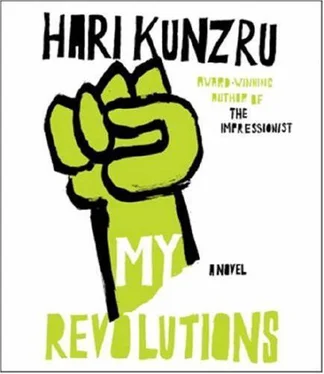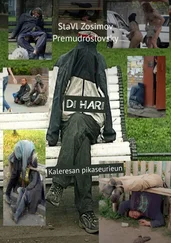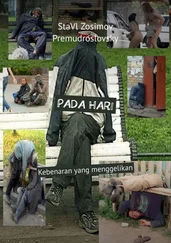For the next couple of months the group was forcibly split up. I drifted around, sleeping on floors and sofas, sometimes with Anna, but often not, which upset me more than I let on. Without even telling me, she went to Ireland for a week with Sean. For a few days I stayed with Pat and Gavin Ellis up in north London. I remember Pat cooking pasta, working on papers at the kitchen table. I stayed at Free Pictures for a while, trying to look after Uther. Free Pictures was a good place to sulk.
In addition to being the guardian of Free Pictures, Uther was the local shaman. Pretty much everyone had their Uther story. He was our talisman, the guy who once painted himself red with household gloss because he was thinking about color. As the most visible freak in the area, he acted as a lightning rod for neighborhood feelings about hippies. He was regularly beaten up; teenagers would follow him around, imitating his complicated, bustling walk. He collected junk, pulling it back on a homemade trailer he’d welded to his bicycle; when it was stolen, he roamed the locality day and night, hairy and tragic, like a despondent wolfhound. The police loathed him. One night, when I wasn’t there, they broke down the cinema door and arrested him. They held him for twenty-four hours and asked him a lot of questions, then released him without charge. Uther swore he’d been cooking and the detectives had tipped the contents of his pan into a bag “for use as evidence.”
After the raid, the doors to Free Pictures were left hanging open. Kids got in and broke the place up. They smashed all the toilet bowls, ripped most of the seats to pieces. Within days the place had been taken over by a group of Italian junkies, who sat squabbling round a fire on the roof. Stinking rubbish silted up in the corners and there was a scorched patch on the floor where someone had started a fire. Uther refused to move out, more or less living behind the screen in the auditorium, wrapped in a blanket and surrounded by the box files containing his most precious possession, an enormous collection of postcards he liked to arrange in
occult sequences on the floor. I tried to chase the junkies off, and I managed it for a while, but Uther was slipping into a state of full-blown paranoia. When he was dancing on the roof of Chatsworth Mansions, he’d already begun to hint at a vast conspiracy, involving the Queen, the Labour Party, and the makers of a particular brand of breakfast cereal whose packet was illustrated with a picture of a glowing child. Later he started to spot threats in newspaper headlines and the license plates of parked cars. His garbled explanations would go on for hours, always arriving at the same conclusion — that he was at risk from some elusive but diabolical force.
One afternoon a friend dropped in to tell me he’d seen Uther being picked up by the police. At one in the afternoon, with hundreds of people walking by, he’d decided to share with the world the genius of William Blake by painting THE ROAD OF EXCESS LEADS TO THE PALACE OF WISDOM in foot-high letters on the side of a building just off the Harrow Road. He’d got as far as Leads.
What bothers me is that we lost track of him. He disappeared into the system and never resurfaced. As soon as we heard of his arrest we tried to bail him out, but before we could get a lawyer to the police station he was sectioned and taken to a hospital out in the north London suburbs. I hated the idea of Uther on a locked ward, but after Mum I had such a horror of mental institutions that it was almost a month before I steeled myself to visit him. I found him morose and suspicious, sitting in front of the television in the common room, watching the news through a haze of medication. After a few minutes of awkward conversation he accused me of being an agent of the Queen and refused to speak anymore.
I told myself that sooner or later Uther would come back, happy and cured. Instead they moved him to another hospital, then another, out of London. There was so much else happening, so many battles to fight, that Uther was left along the way. I’d like to imagine he got out and found a better, easier place for himself, that even now he’s on a beach, gnarly and wrinkled, standing on
his head and spooking backpackers. All I know is, without him things got cold. Cold and hard.
Finally our homeless commune found the Victorian sweatshop that became Workshop Thirteen, a name that (as Anna pointed out) was almost as bad as the “Imperial War Museum” in its combination of negative associations. Thirteen was an old light-industrial unit in Hackney, on a back street near a forlorn patch of park, a place that had once been a garment factory in a row of other garment factories, crammed with Jewish tailors sewing cheap shirts and trousers for the market stalls of the East End. By the time we found it, it had been empty for years. The machines were long gone and the building was just a thin skin of bricks and rotting floorboards, so bowed and warped with age that the whole structure appeared to twist on its axis and the floor sloped in a sharp diagonal from one corner to another. It was drafty in winter and baking in summer. The upper story had been roosted by generations of pigeons; we found it caked with an acrid white carpet of their shit.
The name started as a sort of shorthand. It had none of the complicated meanings I’ve heard ascribed to it. The address was B Moreno Street and on the brick façade was painted some kind of advertisement, which had faded so much over the years that only the single word workshop was still legible. Thirteen was cheap. As in free, once we’d broken the lock and put on our own. No one ever turned up claiming to be the landlord; there were no immediate neighbors. For a long time I don’t think anyone even knew we were there. At first the place saw a rapid turnover of people who used it as a crash pad, staying for a night or two, or a week, or a month. All that had to stop when security became an issue, but for a while Thirteen was a bizarre mix of encounter session, politburo meeting and house party. We cleaned and scrubbed upstairs and pushed mattresses together to make a large soft area, piled with blankets and sleeping bags. If people wanted to go to bed they just grabbed a space. You got used to falling asleep with people fucking right next to you, or rolling onto
sleeping people as you fucked. Downstairs we built kitchen units and a long refectory table and partitioned a bathroom with sheets of plasterboard. We pulled desks and chairs out of skips, rigged lights and switched the water back on, heating it in a tank we ripped out of a house someone had been squatting in Bow. Finally we screwed a thick reinforcing sheet of scrap iron to the door and moved in the printing press, which had been moldering in Charlie’s garden, making Thirteen a propaganda center as well as a living space, a laboratory (or so we intended) for the new society.
The question of violence had started to raise its head. We wanted change. We felt it was part of our duty to sharpen contradictions, to make the difference between the rulers and the ruled glaring and unambiguous, impossible to ignore. This meant confrontation. At meetings or demos we adopted a deliberately aggressive attitude, trying to provoke people and intensify whatever was going on. Our behavior often brought us up against other activists. If they criticized us, we were sarcastic and patronizing; we’d question their courage, the extent of their commitment to the revolution. We began to judge ourselves by our willingness to take risks. I was arrested on a demonstration in Brixton after a young West Indian died in custody. Anna and Helen were wrestled to the floor in a department store when they smashed up a lingerie display. After any action, we’d meet up at Thirteen for what we’d started to call Criticism-Self-Criticism, each of us pointing out moments when we felt we’d failed, when we’d been too conciliatory or someone else’s behavior had fallen short of our increasingly high standards.
Читать дальше












